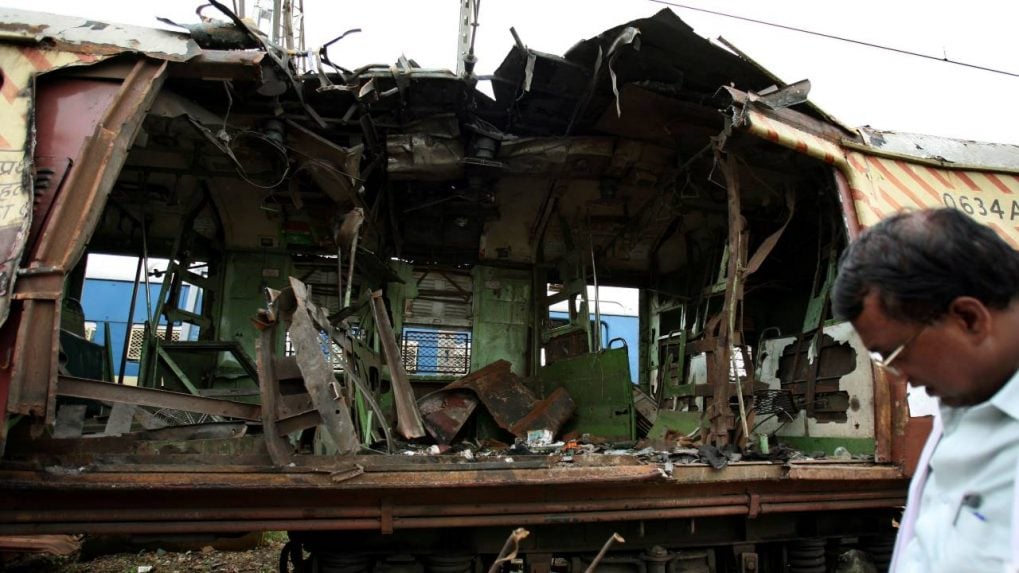
On July 11, 2006, a string of powerful bombs ripped through Mumbai’s commuter trains system in the evening rush hour, killing nearly 200 people and bringing India’s financial capital to a standstill.
Seven blasts were triggered in the span of 11 minutes in the first-class suburban train compartments leaving 189 dead and several injured.
The first bomb went off shortly after 6.20 pm in the Western Railway suburban train running from Churchgate to Borivali. The bomb exploded when the train was between Khar and Santacruz stations. Another bomb exploded at the same time in a local between Bandra and Khar Road. Following this, five more explosions occurred in Jogeshwari, Mahim Junction, Mira Road-Bhayander, Matunga-Mahim Junction and Borivali.
Most of the commuters in these trains were executives, businessmen, employees of government and private establishments and college students.
Here’s a look at the timeline of events that took place since the 2006 Mumbai train bombings.
July 11, 2006:
Between 6.20 pm and 6.35 pm, seven RDX bombs ripped the first-class compartments of Mumbai local trains.
July 14, 2006: Terrorist organisation Lashkar-e-Qahhar, possibly linked to Lashkar-e-Taiba (LeT), claimed responsibility for the bombings through an e-mail to an Indian TV channel.
July 17, 2006: The Mumbai forensic science laboratory said highly explosive RDX and Ammonium Nitrate were used for the bombings. The Anti-Terrorism Squad (ATS) said the bombs were assembled in Chembur.
July 18, 2006: A week after the blast, a memorial service was held in Mumbai to pay tribute to the victims. Sirens were sounded across Mumbai in homage to those who lost their lives, while then President Abdul Kalam led people into observing a two-minute silence.
July 21, 2006: The police arrested three persons in connection with the bombings.
November, 2006: The ATS filed chargesheet in which 13 of those subsequently arrested and 15 absconding were named as the accused under the Maharashtra Control of Organised Crime (MCOCA).
June, 2007: Those who were accused in the 7/11 bombings moved the Supreme Court, challenging the constitutional validity of MCOCA. The following year, the SC ordered a stay on the trial.
September, 2008: Five Indian Mujahideen (IM) operatives were arrested by the Mumbai Crime Branch. Contradiction in the probe by the crime branch and the ATS started to show when the crime branch said IM carried out the bombings, while the ATS said Pakistani nationals planted the bombs.
February, 2009: Arrested leader of the Indian Mujahideen Sadiq Sheikh confessed to conducting the bombings in a news channel broadcast.
February, 2010: Lawyer Shahid Azmi, who defended some of the accused in the Mumbai blast case, was shot dead in his central Mumbai office.
August, 2013: Yasin Bhatkal, co-founder of IM, who was arrested from the Indo-Nepal border, claimed the 2006 bombings were done by IM in response to the 2002 Gujarat riots.
August 2014: The court concluded the 7/11 trial but reserved its judgment.
September 2015: The MCOCA court convicted 12 of the 13 arrested in the case. The court sentenced five convicts – Kamal Ansari, Faisal Shaikh, Estesham Siddiqui, Naveed Khan and Asif Bashir Khan – to death. Seven others – Mohammed Ali, Mohammed Sajid Ansari, Majid Shafi, Dr Tanveer Ansari, Muzzammil Shaikh, Zamir Shaikh and Sohail Shaikh – were sentenced to life imprisonment. The court acquitted one of the accused.
First Published: IST




